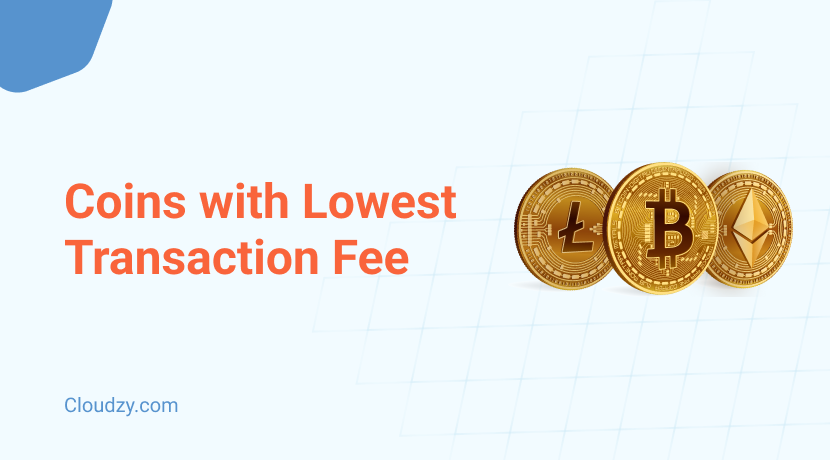Cryptocurrency transactions often come with fees, and depending on the network you use, these fees can be expensive. Whether you’re sending funds across wallets or using crypto for payments, finding the cheapest crypto to transfer can save you money. In this article, we explore the top 10 cryptocurrencies with the lowest transaction fees, making them ideal for frequent transfers.
Why Transaction Fees Matter in Crypto Transfers?
Transaction fees, also known as gas fees, are charges paid to miners or validators to process and confirm blockchain transactions. These fees can vary based on network congestion, blockchain protocol, and transaction complexity. High fees can significantly impact users, especially when transferring small amounts.
Key Factors That Influence Crypto Transfer Costs
- Network congestion: More traffic leads to higher fees.
- Consensus mechanism: Proof-of-Work (PoW) networks like Bitcoin usually have higher fees compared to Proof-of-Stake (PoS) networks.
- Block size and speed: Faster networks with larger block sizes tend to have lower fees.
- Layer 2 solutions: Some cryptocurrencies leverage Layer 2 scaling to reduce transaction costs.
Top 10 Cryptos with the Lowest Transfer Fees
1. Nano (NANO) – Zero Fees and Instant Transfers
- Average Fee: $0.00
- Transaction Speed: Instant
- Why Use Nano?
- No mining fees due to its unique block-lattice technology.
- Ideal for microtransactions and cross-border transfers.
- Environmentally friendly and highly scalable.
2. Stellar (XLM) – Low-Cost Cross-Border Transactions
- Average Fee: $0.00001 per transaction
- Transaction Speed: 3-5 seconds
- Why Use Stellar?
- Designed for fast, low-cost remittances.
- Supports tokenized assets and smart contracts.
- Trusted by financial institutions and payment providers.
3. XRP (XRP) – Efficient and Scalable Transactions
- Average Fee: $0.0002 per transaction
- Transaction Speed: 3-5 seconds
- Why Use XRP?
- Fast settlement times with minimal fees.
- Widely used for banking and cross-border payments.
- High scalability and low energy consumption.
4. Algorand (ALGO) – Secure and Low-Fee Transfers
- Average Fee: $0.001 per transaction
- Transaction Speed: 4 seconds
- Why Use Algorand?
- Supports near-instant finality with low fees.
- Designed for decentralized applications (dApps).
- Uses Pure Proof-of-Stake (PPoS) for efficiency.
5. Litecoin (LTC) – Cheaper Alternative to Bitcoin
- Average Fee: $0.02 per transaction
- Transaction Speed: 2.5 minutes
- Why Use Litecoin?
- Faster and cheaper than Bitcoin.
- Widely accepted across merchants and exchanges.
- Secure and reliable with high liquidity.
6. Tron (TRX) – Cost-Effective for Smart Contracts
- Average Fee: Near $0 (depends on network energy and bandwidth)**
- Transaction Speed: 3 seconds
- Why Use Tron?
- Almost free transactions for regular users.
- High throughput for decentralized applications.
- Strong ecosystem for DeFi and NFTs.
7. Dash (DASH) – Private and Low-Cost Transactions
- Average Fee: $0.002 per transaction
- Transaction Speed: 1-2 seconds (InstantSend feature)
- Why Use Dash?
- Offers both privacy and low fees.
- Fast confirmation times with InstantSend.
- Ideal for everyday purchases and payments.
8. Bitcoin Cash (BCH) – Scalable and Cheaper than Bitcoin
- Average Fee: $0.005 per transaction
- Transaction Speed: 10 minutes
- Why Use Bitcoin Cash?
- Larger block size leads to lower fees than Bitcoin.
- Secure and decentralized with widespread adoption.
- Great for peer-to-peer payments.
9. Hedera Hashgraph (HBAR) – Fast and Inexpensive Transfers
- Average Fee: $0.0001 per transaction
- Transaction Speed: 3-5 seconds
- Why Use Hedera?
- Uses hashgraph consensus instead of blockchain.
- Low-cost and high-speed transactions.
- Supports enterprise applications and tokenization.
10. EOS (EOS) – Free Transfers with Staking
- Average Fee: $0 (users stake EOS for free transactions)
- Transaction Speed: Less than 3 seconds
- Why Use EOS?
- No transaction fees for users who stake EOS.
- High throughput and fast confirmations.
- Ideal for gaming, dApps, and smart contracts.
How to Reduce Crypto Transfer Costs?
If you want to minimize crypto transaction fees, follow these tips:
- Use Low-Fee Cryptos: Choose cryptocurrencies like Nano, Stellar, or XRP for frequent transfers.
- Transact During Off-Peak Hours: Avoid congested times to get lower gas fees.
- Utilize Layer 2 Solutions: Networks like Lightning Network (Bitcoin) or Polygon (Ethereum) reduce costs.
- Use Fee-Free Exchanges: Some platforms offer free withdrawals or lower transfer fees.
- Batch Transactions: If sending multiple payments, consolidate them into one transaction.
Final Thoughts
Finding the cheapest crypto to transfer can help you save money, especially if you make frequent transactions. Nano, Stellar, XRP, and other low-fee cryptos provide cost-effective solutions with fast speeds. By understanding network fees and using the right platforms, you can optimize your crypto transactions and reduce unnecessary costs.
When choosing a cryptocurrency for transfers, consider factors like transaction speed, security, and network stability. Whether you’re sending payments, trading, or moving assets between wallets, selecting a low-fee cryptocurrency ensures you maximize value while minimizing expenses.





